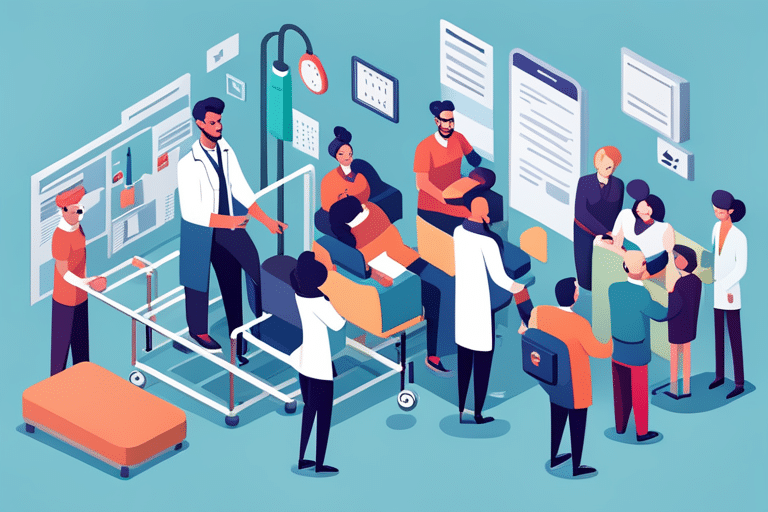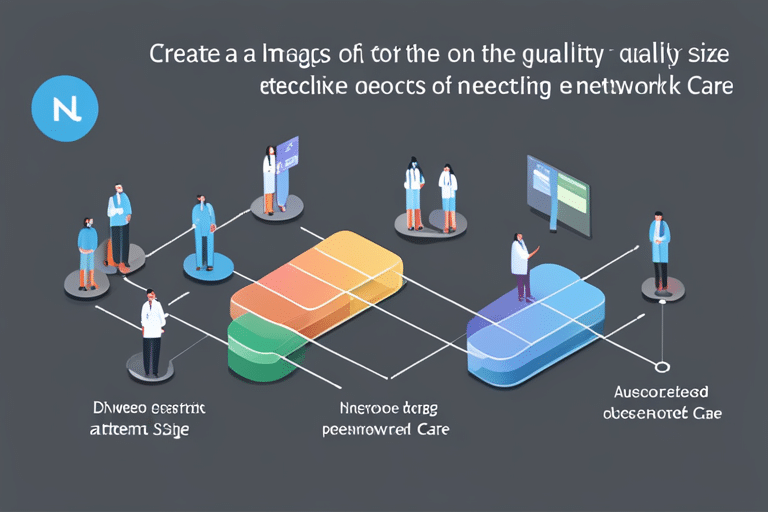Are you ready to dive into the world of health insurance? Well, buckle up because we’ve got an important topic for you: why network size matters in your health insurance selection.
You may have heard the saying ‘bigger is better,’ and when it comes to networks, that couldn’t be more true. In this article, we’ll explore how the size of your network impacts access to healthcare providers, medical costs, quality of care, and so much more.
So get ready to become a master of health insurance selection!
Key Takeaways
- Network size determines the ease of seeing preferred doctors and specialists, with a small network potentially resulting in settling for another doctor or paying out-of-pocket.
- The relationship between network size and medical costs is significant, as a smaller network can save money through lower reimbursement rates, while a larger network may lead to higher costs due to negotiations with providers.
- The impact of network size on the quality of care is notable, with a smaller network limiting options for choosing doctors or specialists and potentially resulting in lower quality care.
- Considering network size is important in health insurance selection as it impacts access to preferred healthcare providers, out-of-network coverage and costs, and helps in finding affordable options that meet individual needs.
The Impact of Network Size on Access to Healthcare Providers

The impact of network size on access to healthcare providers can’t be overstated. When it comes to choosing your health insurance, the size of the network plays a crucial role in determining how easily you can see your preferred doctors and specialists.
Imagine this: you’re feeling under the weather and need to see a doctor urgently. But wait! Your insurance plan has a small network, and unfortunately, your favorite doctor is not in it. What do you do? You either settle for another doctor or pay out-of-pocket to see your preferred one. This situation can greatly affect patient satisfaction.
Having a wide network means having more options when it comes to healthcare providers. It ensures that you have access to a diverse range of doctors, specialists, hospitals, and clinics. This way, if one provider doesn’t meet your needs or preferences, you can easily switch to another within the same network without any hassle.
Moreover, network adequacy assessment is an essential factor in evaluating the impact of network size on access to healthcare providers. Insurance companies conduct these assessments regularly to ensure that their networks are capable of meeting the needs of their policyholders adequately. These evaluations consider factors such as geographical coverage, appointment availability, and specialty care services.
Understanding the Relationship Between Network Size and Medical Costs

Understanding how network size impacts medical costs is crucial when choosing your health coverage. You might think, ‘Why does it matter? Can’t I just go to any doctor I want?’ Well, my friend, let me enlighten you on this important topic.
When it comes to health insurance, bigger isn’t always better. In fact, having a smaller network of healthcare providers can actually save you money. How, you ask? It’s all about network adequacy.
Network adequacy refers to the number of doctors and hospitals that are included in your insurance plan. A larger network may seem appealing at first glance because it offers more options for care. However, this can also mean higher costs. Think about it – if your insurance company has contracts with a vast number of providers, they have to negotiate higher reimbursement rates with each one. And guess who ends up paying for those inflated prices? That’s right – you!
On the other hand, a smaller network means fewer negotiations and lower reimbursement rates. This translates into cost savings for both the insurance company and you as the policyholder. So next time you’re shopping for health coverage, don’t dismiss plans with smaller networks.
Remember, choosing the right health insurance is not just about access to doctors; it’s also about finding affordable options that meet your needs. By understanding how network size impacts medical costs and considering factors like network adequacy, you’ll be well on your way to making an informed decision that saves you both hassle and money.
How Network Size Affects the Quality of Care You Receive

Hey there! Now that we’ve talked about network size and how it affects medical costs, let’s dive into another important aspect: provider availability and access, and how it impacts your healthcare outcomes.
Picture this – having a smaller network might mean limited options when it comes to choosing doctors or specialists. That could potentially affect the quality of care you receive.
Provider Availability and Access
Having a smaller network can limit your access to healthcare providers. It’s like being stuck in a tiny town with only one doctor, and you’re desperately in need of medical attention.
You start to panic because you realize that your health insurance plan doesn’t have enough doctors and hospitals in its network. This means you may have to travel far or wait for weeks just to see a specialist or get the care you need.
And even when you do find a provider, there’s another challenge – provider reimbursement rates. Some insurance plans pay providers less than others, which can lead to limited options and lower quality care.
Impact on Healthcare Outcomes
Limited access to healthcare providers can negatively impact your overall health outcomes. Having a smaller network of providers means fewer options for you to choose from when it comes to receiving the care you need. And let’s face it, nobody wants their health outcomes compromised!
Research has shown that the size of your insurance network can have a direct impact on patient satisfaction and preventive care. When you have a larger network, you have more choices and are more likely to receive timely and appropriate preventive services. This not only improves your health but also keeps you happy and satisfied with your healthcare experience.
But wait, there’s more! The role of network size doesn’t just end here; it also plays a crucial role in determining out-of-network coverage. Let’s dive deeper into this fascinating topic!
The Role of Network Size in Determining Out-of-Network Coverage

Alright, listen up! Let’s dive into the nitty-gritty of network size and how it can affect your coverage. Brace yourself because here are three key points you need to know:
First, the size of your network directly impacts the range of healthcare services available to you.
Second, out-of-network costs can vary wildly depending on your insurance plan and provider.
And finally, having access to a wide array of healthcare providers is crucial for getting the care you need when you need it.
Now, let’s break down each of these points and get you informed!
Network Size Impacts Coverage
When choosing your health insurance, it’s important to consider how network size impacts your coverage.
Picture this: you’re at the doctor’s office, ready to take charge of your health. But wait! Your insurance only covers doctors within a small network. Uh-oh, that means limited choices and potentially restricted access to top-notch care.
Network size matters because it determines the range of healthcare providers available to you. Want preventive care? A larger network increases your chances of finding specialists who focus on preventative measures like screenings and vaccinations.
Plus, studies show that patients are more satisfied when they have a wider selection of doctors and hospitals to choose from.
Out-Of-Network Costs Vary
Choosing a plan with a larger network can offer you more options and potentially save you money on out-of-network costs.
Let’s talk about those pesky out-of-network expenses. Picture this: you’re at the doctor’s office, feeling pretty confident because you have health insurance. But wait! Turns out that doctor isn’t in your insurance network. Uh-oh! Cue the high out-of-network reimbursement costs. These unexpected bills can really throw a wrench in your financial plans.
That’s where choosing a plan with network adequacy comes into play. A larger network means more doctors, specialists, and healthcare providers to choose from within your coverage limits!
Importance of Provider Access
Remember, having access to a wide range of providers is crucial for finding the right healthcare professional that meets your specific needs. When it comes to selecting a health insurance plan, you want to make sure that the provider network is adequate and can offer you the care you deserve. Let’s take a moment to understand why this is so important.
| Provider Network | Network Adequacy |
|---|---|
| More options | Better chances |
| for finding the | of finding a |
| right provider | suitable match |
Having a diverse provider network means more options and better chances of finding the right healthcare professional who understands your unique situation. Whether you need a general practitioner, specialist, or even alternative medicine practitioner, having access to a variety of providers ensures that your specific needs are met.
Now let’s dive deeper into the importance of network size and the availability of specialists and subspecialists…
Network Size and the Availability of Specialists and Subspecialists

You should consider the availability of specialists and subspecialists in your health insurance network size. When it comes to your healthcare, having access to a wide range of specialists can make all the difference.
Imagine this: you wake up one morning with a sharp pain in your abdomen that won’t go away. You’re worried, so you call your primary care doctor, who advises you to see a gastroenterologist immediately. But here’s the catch – if you don’t have access to a gastroenterologist within your network, you may have to wait weeks or even months for an appointment. That’s where network size comes into play.
Having a large network means more options and greater accessibility when it comes to finding the right specialist for your needs. Whether it’s a cardiologist for heart issues or an orthopedic surgeon for joint problems, having these experts within reach is essential for proper diagnosis and treatment.
But what exactly does ‘network size’ mean? It refers to the number of healthcare providers, hospitals, and clinics that are contracted with your insurance company. The larger the network size, the more extensive your options become.
So why does this matter? Well, let’s say you need surgery for appendicitis or suffer from a sudden heart attack – situations where time is of utmost importance. Having a larger network increases the likelihood of finding an available provider promptly during emergencies.
The Importance of Network Size in Emergency Situations

When it comes to emergency situations, having a larger network can be a lifesaver. Picture this: you’re out hiking in the woods, enjoying nature’s beauty, when suddenly you trip and break your ankle. Ouch! In that moment of panic and pain, what do you need most? You need help, and you need it fast. This is where the impact of network size on emergency care becomes crucial.
In an emergency situation, time is of the essence. You don’t have the luxury of waiting for hours or even days to see a doctor. With a larger network, there are more providers available to attend to your needs promptly. Whether it’s finding the nearest hospital or connecting with an ambulance service, a larger network ensures that help is just a phone call away.
Now imagine if you were stuck with a smaller network. Your options might be limited and provider availability could become scarce. Imagine sitting in excruciating pain for hours because there simply isn’t anyone nearby who can help you. It sounds like something out of a horror movie!
But fear not! By choosing a health insurance plan with a large network size, you can ensure that in times of crisis, help will always be within reach. Don’t underestimate the importance of provider availability in emergency situations – it truly can make all the difference between life and death.
Network Size and the Flexibility to Choose Your Preferred Healthcare Providers

Imagine being able to freely choose the healthcare providers that best meet your needs and preferences, without any limitations imposed by the size of your network. Picture a world where you have the flexibility of choice when it comes to your healthcare, where you can see any doctor or specialist that you desire. No longer would you be restricted to a narrow selection of providers within a limited network. Instead, you would have access to a wide array of healthcare options, ensuring that you receive the best possible care.
Having the ability to choose your preferred healthcare providers is crucial in ensuring that you receive quality medical treatment. When given the freedom to select from a variety of doctors and specialists, you can find professionals who align with your personal beliefs, values, and treatment preferences. This not only enhances your overall experience but also increases the likelihood of achieving positive health outcomes.
Furthermore, having an expansive network means greater availability of healthcare providers. You won’t have to worry about long wait times or limited appointment availability with popular doctors. With more choices at your disposal, scheduling appointments becomes easier and more convenient.
The flexibility of choice in selecting healthcare providers also allows for better coordination among different specialists involved in your care. You can assemble a team of experts who collaborate seamlessly together, ensuring comprehensive and efficient treatment plans tailored specifically for you.
How Network Size Can Impact the Timeliness of Care

In a larger healthcare network, more providers are available to meet your needs and ensure timely care. Picture this: you wake up one morning with a stuffy nose and a scratchy throat. You know it’s time to see a doctor, but you don’t want to wait days for an appointment. That’s where the timeliness of care comes into play.
When you choose a health insurance plan with a larger network size, you have access to a wide range of providers. This means that there will be more doctors, specialists, and clinics available in your area who can see you quickly. No more sitting around in waiting rooms for hours on end!
Imagine having the convenience of being able to call multiple doctors and getting an appointment within days, or even hours! With a larger network size, this becomes possible because there is simply more availability when it comes to healthcare providers.
Not only does having access to more providers improve the timeliness of care, but it also gives you peace of mind knowing that if something unexpected happens or if you need specialized treatment, there will be options readily available. Whether it’s finding the right specialist for your condition or seeking out urgent care services on short notice, a larger network can make all the difference.
Factors to Consider When Evaluating the Network Size of Health Insurance Plans

If you want timely care, it’s important to consider the range of available healthcare providers when evaluating different health insurance plans. The size of the network plays a crucial role in determining whether you will have access to the care you need when you need it. So, what factors should you consider when evaluating network size? Let’s take a look!
| Factors to Consider | Evaluating Network Size |
|---|---|
| Number of Providers | Is the network large enough to accommodate your needs? Are there enough doctors and specialists in your area? |
| Geographic Coverage | Does the network cover healthcare facilities in your preferred locations? Will you have access to providers near your home or workplace? |
| In-Network vs Out-of-Network Care | Are there penalties for seeking care outside of the network? How much will it cost if you need to see an out-of-network provider? |
| Specialty Services | Does the network include providers who specialize in the specific services or treatments that you may require? |
Evaluating these aspects of network size can help ensure that your health insurance plan meets your needs and provides timely care. By considering factors such as the number of providers, geographic coverage, in-network vs out-of-network care, and specialty services, you can make an informed decision about which plan is right for you.
Frequently Asked Questions
What Is the Average Network Size for Health Insurance Plans in the United States?
The average network size for health insurance plans in the United States varies due to regulations or guidelines. It’s important to consider this when selecting a plan that meets your healthcare needs.
Are There Any Regulations or Guidelines in Place Regarding the Minimum Network Size for Health Insurance Plans?
Are there any regulations or guidelines for minimum network size in health insurance plans? Well, my friend, you’ll be glad to know that yes, there are! Let’s dive into the details and unravel this mystery together.
How Does Network Size Affect the Availability of Primary Care Physicians?
Having a larger network size can greatly impact the availability of primary care physicians. With more doctors in the network, you’ll have a better chance of finding a PCP that suits your needs and preferences.
Can Network Size Impact the Wait Times for Appointments With Specialists?
Yes, network size can impact wait times for appointments with specialists. A larger network means more specialists available, reducing wait times and ensuring you get the care you need faster.
Are There Any Studies or Research That Demonstrate the Correlation Between Network Size and Patient Satisfaction?
Yes, there are studies that show a correlation between network size and patient satisfaction. Larger networks offer more healthcare access options, improving patient outcomes and overall satisfaction with their health insurance selection.
Conclusion
You’ve made it to the end! Now that you know why network size matters in your health insurance selection, you’re equipped with the power to make an informed decision.
Remember, a larger network is like having a superhero team by your side, ready to tackle any medical challenge that comes your way.
With their vast array of providers and specialists, you’ll have access to top-notch care and enjoy the flexibility to choose your favorite healthcare heroes.
So go forth and conquer, armed with the knowledge of network size!

